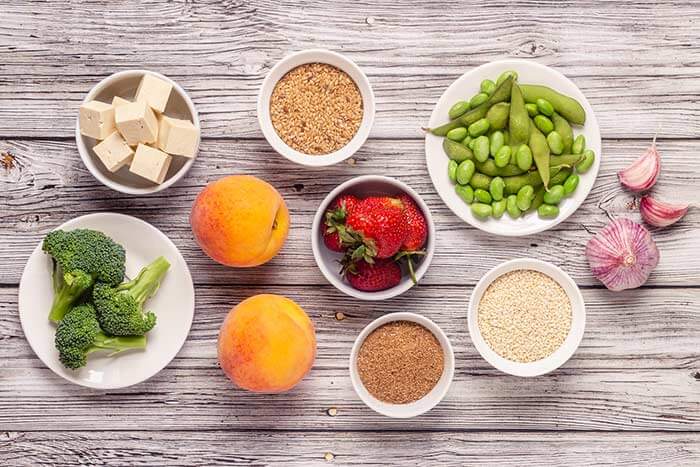Menopause can be a difficult time for many women, not only suffering hot flushes, night sweats and mood swings, gaining excess kilograms may also seem like an inevitable side effect. The reality is, by making a few small lifestyle changes, it is possible to maintain your current weight and even shed a few pounds during your middle-age years.
Naturimedica is a holistic health and wellness hub founded by specialist hormone nutritionist, Joanna Sochan, who strives to make engaging with a nutritionist online easy and affordable for everyone. Read on to learn about weight gain during menopause and a few simple things you can do to prevent it.
What causes menopause weight gain?
Before, during and after menopause, estrogen levels begin to decline and metabolism slows, this can increase the chance of weight gain, particularly around the abdomen. However, hormonal changes alone aren’t the only cause, other factors may include:
- Ageing – muscle mass diminishes with age and losing muscle mass slows the rate at which your body uses calories. If you continue to eat as you always have without increasing physical activity, it’s likely you will gain weight.
- Genetics – if your parents or other close relatives carry extra weight around the abdomen, it’s possible you will too.
- Lifestyle – a lack of exercise, unhealthy eating habits and a lack of sleep can also contribute to menopause weight gain.
- Stress – excessive stress contributes to hormone imbalances and increases cortisol production which contributes to weight gain, especially around the middle.
Ways to prevent weight gain
Unfortunately, there’s no magic potion for stopping an increase on the scales, but there are a few things you can incorporate into your lifestyle to give you the best chance of maintaining your weight.
Enjoy a Healthy Diet
Your metabolism has slowed down by the time you hit menopause. During your 50s, it is estimated that you might need around 200 fewer calories per day than you did during your younger years to maintain your current weight. It’s important to reduce your calorie intake without sacrificing nutrition so fill your meals with fruits, vegetables and whole grains, legumes, nuts, fish and low-fat dairy products. Try to limit your intake of red meat and replace butter with olive or vegetable oil.
Avoid soft drinks, juices, energy drinks, flavoured waters and alcoholic beverages, as these can add excess calories to your diet without providing any nutritional benefits. Eat seasonal produce as often as possible!
Get Enough Sleep
Inadequate sleep can impact the hunger hormones, ghrelin and leptin, and can cause binge-eating and over-eating. Aim for a minimum of seven (ideally eight) hours of sleep each night. Menopause can make sleeping difficult so avoid coffee late in the day, keep your bedroom cool to offset hot flashes and night sweats, and turn off screens at least an hour before you want to go to sleep.
Reduce Stress Levels
Cortisol, also known as the stress hormone, stimulates your fat and carbohydrate metabolism, creating a surge of energy in your body. While this process is essential for survival situations, if your cortisol levels are constantly high because of chronic stress, it will increase your appetite, cause cravings for sweet, fatty and salty foods and make it easier for fat to be stored around your belly.
To reduce stress, you should employ some simple calming techniques, such as:
- Stepping outside to enjoy the greenery – research shows that being in nature can help reduce stress.
- Meditation – just 10 minutes a day can help to improve relaxation and promote a tranquil mind.
- Walking – a brisk walk can boost endorphins, which helps to reduce stress hormones.
Step up Your Activity Level
Physical activity is one of the best ways to maintain a healthy weight. Your exercise routine should include aerobic exercises, such as swimming, walking, cycling or running, in combination with strength training. Gaining muscle makes your body burn calories more efficiently, which makes it much easier to control your weight.
Experts recommend that all healthy adults should perform 150 minutes of moderate-intensity aerobic activity every week, and 75 minutes a week of muscle-strengthening activities that work all of the major muscle groups. Another great way to increase your movement is to sit less and stand more. Studies have found that a person who weighs around 65 kilograms could potentially burn 54 calories a day by standing, instead of sitting, for six hours.
Seek Support
The key to success is to surround yourself with friends and family who will support you as you transform your eating-habits, modify lifestyle and increase your physical activity. Even better, team up with other likeminded individuals make the changes together. Also seek advice and support from qualified health practitioners.
As you get older, maintaining your usual weight becomes more difficult, but it’s important to remember that weight gain is not inevitable, committing to a few small lifestyle changes can help you stay healthier and happier throughout menopause and beyond.
If you have been looking for a hormone nutritionist to help with the symptoms or side effects of menopause, get in touch with Naturimedica today. Aiming to make expert health advice readily accessible to everyone, we offer online consultations so you can speak with a leading nutritionist online from the comfort of your home or workplace.
Book an online consultation now and start the journey to a healthier you today.
Joanna Sochan
Wholistic Health and Lifestyle Therapist
Natural and Lifestyle Therapies for Abundant Health and Wellbeing
Disclaimer: The above material is for informational and educational purposes only. It should not be used to self-diagnose and it is not a substitute for a medical advice, diagnosis, treatment, prescription or recommendation. All viewers of this content, especially those taking prescription or over-the-counter medications, should not make any changes in their health regimen or diet before first consulting a doctor or other qualified health provider with any questions they may have regarding a medical condition or their particular circumstances.

Joanna Sochan is a Natural Therapist and founder of Naturimedica Holistic Wellcare. She has a passion for helping clients transform their lives by becoming healthy and well naturally. Joanna has 12+ years experience in clinical practice and has special interest in solving complex cases, gut health, food sensitivities, hormone imbalances, autoimmune disorders and weight loss. She helps clients individually (mostly online) Australia-wide and also offers online therapeutic programs, eCourses and self-help books. View full bio.
 Print This Post
Print This Post 

Leave A Comment